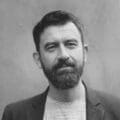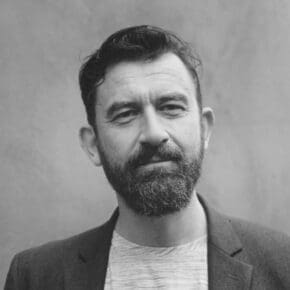Q – Hi Paul, and thanks for joining us. Shall we begin by asking what the most useful piece of writing advice you’ve received is?
Paul McVeigh – Thanks for having me! I’ve received lots over my career. One of the best is to read your work out loud while editing and, if you have the chance, get someone else to read the work to you. It’s amazing how you read what you meant to write and how the other person reads what’s actually on the page.
Q – I enjoyed your talk in Salisbury about openings. Can you offer any tips for getting them right?
PM – The first page of a short story and the first chapter of a novel are incredibly important. You must set up a mystery for us, and give us questions that need answering. They have to be compelling enough to make the reader want to go on and discover the answers.
Q – I find myself writing my openings over and over, and then I end up tweaking forever and never being satisfied. How can I get over this?
PM – I think a lot of writers feel the same, and at some point you have to stop. Give it to a trusted reader – later your agent, editor or publisher – and if they say it’s done, close the document and don’t look at it again. Take the decision out of your hands.
I’m with Hemingway on this: I read what I have written and edit that before starting the next bit. However, you must find the way that works for you. Teachers can only show the methods and make suggestions.
Ultimately, you have your own unique set of life circumstances too — whether morning or night, plotter or pantser. You cherry-pick how you work. Take what makes you a better writer and leave what doesn’t.
Q – Do you focus on characterisation or do you let your work shape the characters?
PM – I’m not sure it’s an either/or. For The Good Son, I knew the character and had a skeleton plot. With each draft the character became more developed and refined, and that changed the plot.
By the end you could have asked me ‘what would he do at the cinema?’ and I could’ve sat down and written that in 15 minutes – I knew the character so well.
You also often realise the plot you had intended doesn’t quite work with your refined character and you need to adapt it to the nuances of the refined character.
Always read the agent/agency bio in the Writer and Artists’ Yearbook – some can get pretty annoyed regarding simultaneous submissions. It’s hard to be patient but you must.
– Paul McVeigh
Q – In terms of short stories (rather than flash fiction), what’s an ideal length?
PM – In the USA a very short story is about 5–7,000 words; in the UK the average story length is about 3,000. I’ve just done my second for Radio 4 which is 2,200 for a 13-minute slot. Bigger competitions like the Sunday Times will allow longer stories, however.
Q – That’s really helpful. Interesting it’s so different in the UK to the US. When can we hear your story on R4?
PM – Yes, many writers don’t fully understand the differences in the industry across the pond. And 22 November 2019!
Q – I’m currently querying agents, and I’ve had a couple of full manuscript requests. There are more I’d like to get in contact with, but should I wait to hear back from this batch first in case they give me useful feedback on what to improve?
PM – I’d hold off for that reason. Always read the agent/agency bio in the Writer and Artists’ Yearbook – some can get pretty annoyed regarding simultaneous submissions. It’s hard to be patient but you must.
See if the agent gives an average waiting period, and nudge after that. There’s nothing wrong with calling the office and asking the secretary – they don’t bother the agent and they are usually sympathetic.
Try to listen to advice – you always have your other version. If you rewrite and then think it’s bad advice and your story is worse off for it, tell them so. My experience, however, is that they are normally right.
– Paul McVeigh
Q – Since querying I have felt unable to do any new writing – probably because I’m waiting for confirmation that I can actually write! Have you been through anything similar yourself and do you have any tips?
PM – Yes, I have. It’s a tough one – even worse when the book has been accepted and there’s a year or more wait until its published. Get a group of writing buddies – or just you – and force yourself with deadlines. You’ll have to show them something!
Q – Have you been in the situation where an editor wants you to turn your story into something else? If so, how do you handle it?
PM – Yes – with Radio 4 very recently! The looser you are with a story the better, I say. Try it – you always have your other version. If you rewrite and then think it’s bad advice and your story is worse off for it, tell them so.
My experience, however, is that they are normally right. And even if they’re not wholly right, the work comes out better for the little things the new version gave you.
Q – Do you think comedic writing is more impactful if written in the first person?
PM – There’s an argument that ALL writing is more impactful in the first person, but this depends on whether impact is your goal. Laugh-out-loud funny, sly side-of-the-mouth smile funny, political satire or slapstick, ridiculous or fiendishly clever…
My advice is – drum roll – write the way YOU are funniest. Hit them with your best shot.
At that point there’s only one thing to do: show it to someone else, someone you trust. Get their advice and see if it helps – either by giving you what was missing or by confirming you were right.
– Paul McVeigh
Q – Have you got any tips about the best place to find out about short story competitions?
PM – You can always have a look at my blog – I post competitions, interviews, stories to read, podcasts, submission opportunities and more. Also, sign up to the Word Factory newsletter. You can also follow them on Facebook and Twitter.
Q – How closely should you stick to the ‘write what you know’ saying?
PM – As closely as you want – do what produces your best writing. I start close to home and by the end it’s barely recognisable. You can do research – read other novels and non-fiction books that inform you, and watch films with the accent, say, to get it authentic.
Q – How many drafts do you get through on average before a story is ready for submission?
PM – How long is a piece of string? Some stories I’ve written in one sitting with minimal editing. Others have been on my computer for 15 years and I still can’t get them right. But it’s usually about confidence. We don’t know when to let something go.
At that point there’s only one thing to do: show it to someone else, someone you trust. Get their advice and see if it helps – either by giving you what was missing or by confirming you were right.
Q – What tips do you have on creating dark characters or stories with a sense of dark humour?
PM – I love dark humour. Darkness usually comes through character and plot – the character can be sarcastic or cruelly funny in dialogue. Darkness and humour can come through in certain situations too.
However, I think it should be organic through the above rather than tagged on for effect. Dark humour normally comes from the fact that the situation is so goddamn bleak that there’s no choice!
Q – Paul, thank you for your time and advice!
PM – No problem, it’s been great. Good. Luck with your writing!

























